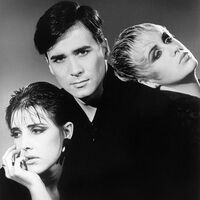The Human League: Difference between revisions
No edit summary |
No edit summary |
||
| Line 1: | Line 1: | ||
[[File:The Human League.jpeg | 200px | right | thumb |The Human League]] | |||
==Relevance== | ==Relevance== | ||
{{Page | {{Page | ||
Latest revision as of 16:28, 11 April 2023
Relevance
Mentioned In
Discogs Information
Profile
Electronic band from Sheffield, England. Formed in 1977 by Martyn Ware and Ian Craig Marsh. Originally called 'The Future', but changed their name to 'The Human League' in 1978 with the addition of vocalist Phil Oakey and the release of the single "Being Boiled".
This original lineup lasted until 1980, after which Ware and Marsh left to form Heaven 17. Oakey kept the band name and added female vocalists, and it is this incarnation that gained widespread popularity.
Mainly known for a synthesizer based pop sound, in particular the song “Don’t You Want Me”.
In 1982 The Human League released a remix album, Love and Dancing, under the band name The League Unlimited Orchestra as a nod to Barry White's disco-era Love Unlimited Orchestra.
External Links
- https://www.discogs.com/artist/10383-The-Human-League
- https://www.thehumanleague.co.uk/
- https://www.facebook.com/thehumanleague
- https://x.com/humanleaguehq
- https://www.instagram.com/humanleaguehq/
- https://www.youtube.com/user/thehumanleague
- http://www.humanleague.dk/
- https://www.blindyouth.co.uk/
- https://www.the-black-hit-of-space.dk/
- https://en.wikipedia.org/wiki/The_Human_League
Wikipedia Information
 |
The Human League are an English synth-pop band formed in Sheffield in 1977. Initially an experimental electronic outfit, the group signed to Virgin Records in 1979 and later attained widespread commercial success with their third album Dare in 1981 after restructuring their lineup. The album contained four hit singles, including the UK/US number one hit "Don't You Want Me". The band received the Brit Award for Best British Breakthrough Act in 1982. Further hits followed throughout the 1980s and into the 1990s, including "Mirror Man", "(Keep Feeling) Fascination", "The Lebanon", "Human" (a second US No. 1) and "Tell Me When". The only constant band member since 1977 has been lead singer and songwriter Philip Oakey. Keyboard players Martyn Ware and Ian Craig Marsh both left the band in 1980 to form Heaven 17, leaving Oakey and Adrian Wright to assemble a new line-up. The Human League then evolved into a commercially successful new pop band, with the line-up comprising Oakey, Wright, vocalists Joanne Catherall and Susan Ann Sulley, bassist and keyboard player Ian Burden and guitarist and keyboard player Jo Callis. Wright, Burden and Callis all left the band by the end of the 1980s, since which time the band has essentially been a trio of Oakey, Catherall and Sulley with various sidemen. Since 1978, the Human League have released 9 studio albums, a remix album, a live album, 6 EPs, 29 singles and 13 compilation albums. They have had 6 top 20 albums and 13 top 20 singles in the UK and had sold more than 20 million records worldwide by 2010. As an early techno-pop act that received extensive MTV airplay, they are regarded as one of the leading artists of the 1980s Second British Invasion of the US.
